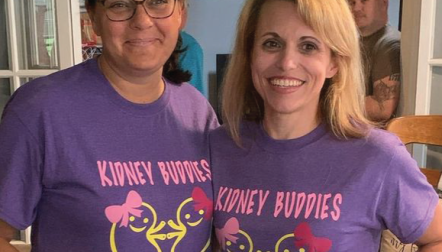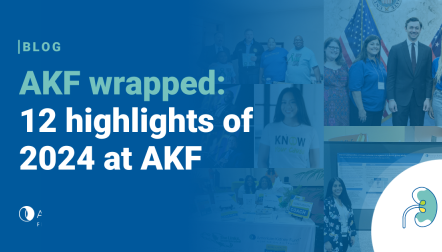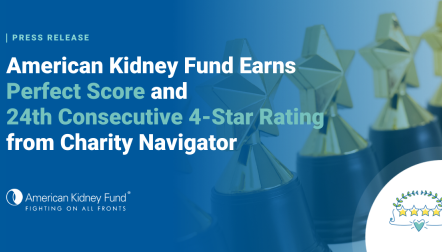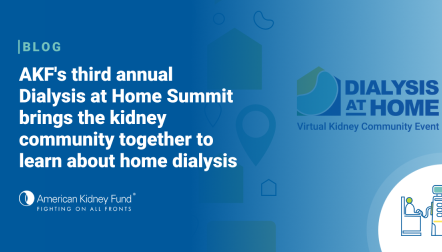
Blog post
Kidney Health for All: A worldwide cause for World Kidney Day that AKF champions for Americans

Today is World Kidney Day, a day to raise awareness of the importance of our kidneys to our overall health. The theme for the celebration this year is "Kidney Health for All," with an emphasis on improving access to care and medicines that will help prevent or slow the progression of kidney disease. World Kidney Day aims to address issues of health equity across the globe.
People of all races and backgrounds can have kidney disease, but in the United States, people of color are more likely to develop kidney failure than white people with kidney disease. In fact, according to the U.S. Renal Data System, Black people are more than four times more likely to develop kidney failure and Hispanic or Latino people are twice as likely to develop kidney failure compared to white people. People of color living with kidney failure are also less likely to receive a kidney transplant. Some causes of these health disparities are genetic, however, studies by the National Institutes of Health have shown that social determinants, structural racism and implicit bias also play a more significant role.
The American Kidney Fund (AKF) welcomed health equity as the selected theme for World Kidney Day, as tackling health inequities in kidney disease is and has been a top priority since our founding in 1971. In an effort to further solidify this commitment, AKF launched Kidney Health for All™ in 2021 to address four specific areas where there are racial inequities in kidney disease: prevention and awareness, home dialysis, participation in clinical trials and access to transplant.
"The crisis in kidney disease has continued unabated, and nowhere has it been felt more than in underserved communities," said LaVarne A. Burton, AKF President and CEO, about the creation of the Kidney Health for All initiative. "We must do more collectively to tackle health disparities and inequities in health care, which have had an immeasurably devastating impact in the kidney community."
AKF's Kidney Health for All campaign is centered around four pillars of action that address ways to improve kidney health from prevention and diagnosis to post-transplant life. The Kidney Health for All website has tools and resources to help empower you to have productive conversations with your doctors and make informed decisions about your health related to each pillar:
Preventing and slowing the progression of kidney disease
Early detection and prevention of kidney disease is critical for starting the appropriate interventions to delay or stop the progression of the disease to kidney failure. Unfortunately, 9 out of 10 people with kidney disease are unaware they have it, often not learning of their disease until it has reached the later stages. Again, this is especially true for people of color. As part of our health equity initiative, AKF is prioritizing spreading awareness within communities of color of the importance of early detection and prevention, emphasizing the connection between diabetes, high blood pressure, heart disease and kidney disease.
Learn more about your risk for kidney disease and the tests to screen for kidney disease in the Prevention section of Kidney Health for All.
Increasing diversity in clinical trials to reflect the populations the medications will treat
Clinical trials are an essential part of testing the safety and effectiveness of new medications and treatments. To ensure new treatments are as effective as possible, it is critical that trials recruit participants from all racial and ethnic backgrounds so that researchers will know whether the treatments work for all people who may need them. Unfortunately, multiple barriers exist that have contributed to a lack of diversity in clinical trials, including lack of trust based on past historical abuses, language and cultural differences, logistical complications, health literacy, religion and a lack of awareness and knowledge about what clinical trials are and what it means to participate in one. The Kidney Health for All microsite addresses this pillar of health equity by building on the diversity in clinical trials campaign AKF launched in 2022.
Learn more about clinical trials, including the benefits for you as a participant on the Clinical Trials section of Kidney Health for All.
Increasing awareness and utilization of home dialysis, which can result in better outcomes, as an available treatment option
According to the United States Renal Data System, the percentage of patients on dialysis performing home dialysis increased from 7.5 in 2011 to 13.4 in 2021. White (18%) and Asian (19%) patients are substantially more likely to dialyze at home than Black (10.6%) and Hispanic/Latino (11.6%) patients. Part of the reason for this discrepancy is because providers often do not present home dialysis as an option. They may have a limited knowledge of the practice or may make assumptions regarding their patients' qualifications for using it. However, home dialysis can result in a better quality of life for people with kidney failure, providing more flexibility than an in-center dialysis treatment schedule. This in turn can improve employment options, something that can also impact access to health insurance. Furthermore, home dialysis lowers the risk of infection and can expand options for a person's food and fluid plan. AKF's health equity initiative focuses on ensuring that all people on dialysis know that home dialysis is available to them and the benefits this option can provide.
Check out our recently launched home dialysis resources, including a home dialysis decision aid and debunking home dialysis myths, on the Home Dialysis section of Kidney Health for All.
Increasing access and removing barriers to kidney transplantation among people of color
When kidney disease has progressed to the point of kidney failure, the only treatment options are dialysis and a kidney transplant. A transplant is the best treatment option because it improves your health outcomes and quality of life as well as extending your life for more years. Unfortunately, Black Americans are only half as likely to undergo kidney transplantation as white Americans and are 25% less likely to be added to the transplant waitlist (after adjusting for medical factors and social determinants of health).
This difference is partly because one of the main determinants of someone's spot on the transplant list, estimated glomerular filtration rate (eGFR), has until recently been calculated factoring in race. Race-factored eGFR calculations negatively affected Black people's ability to be placed on the transplant list or put them much lower on the list. Fortunately, the standards for the eGFR are being changed and the United Network of Organ Sharing (UNOS) changed its waitlist policy to correct the impact of the race-factored eGFR. UNOS reported in January that nearly 15,000 waiting-time modifications had been completed as of Jan. 15, 2024 – a wonderful example of the positive outcome from this policy change. However, there are several other common barriers to transplantation for people of color that AKF's health equity initiative will help to address. These include a perceived lack of social support among transplant center providers, delayed diagnosis of kidney disease (meaning lower rates of preemptive transplants), socioeconomic qualifications like personal finances or transportation, and inadequate health insurance coverage.
Find out more about the transplant process, living organ donation and AKF's Health Insurance Premium Program (HIPP) on the Transplant section of Kidney Health for All.
As part of the initiative, AKF created and convened the AKF Health Equity Coalition, comprised of 27 organizations, patients and caregivers that advise and help guide the development of evidence-based programs and resources for AKF's patient and professional audiences. Their input, along with firsthand experiences and insights we collected from our AKF Ambassadors, informed the development of the Kidney Health for All initiative.
In 2023, AKF also launched a health equity training program for AKF Ambassadors, offered both virtually and in-person to communities across the country touched by kidney disease, including patients, caregivers and health care professionals. These trainings aim to connect advocates to each other, train attendees how to be an effective advocate, help attendees develop an understanding of health equity impacting people with kidney disease and empower attendees to advocate for laws, policies and regulations that impact the kidney community. Even if you haven't attended a training, you can take action and get involved in AKF's advocacy efforts to incorporate health equity into policy changes at the state and federal level.
This World Kidney Day, join an international movement to promote Kidney Health for All!






